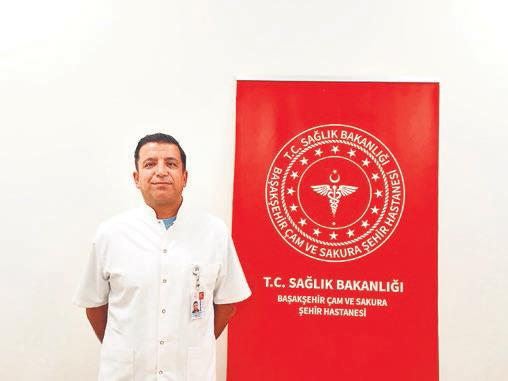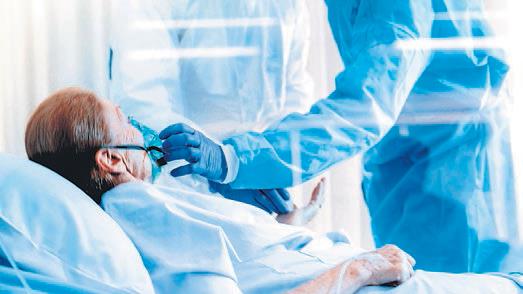Deadly infection: Sepsis

Sepsis (blood infection) is a very important and dangerous health problem that many people have never heard of, but is actually a very important and dangerous one. World Sepsis Day, September 13th, is drawing attention to this dangerous infectious disease. In this context, Başakşehir Çam and Sakura City Hospital Infectious Diseases and Clinical Microbiology Specialist Assoc. Prof. Dr. Ramazan Korkusuz shared important information. Assoc. Prof. Dr. Korkusuz stated that the purpose of World Sepsis Day, September 13th, is to raise public awareness, warning, "People recognizing this silent danger, knowing the symptoms, and taking swift action when necessary can save many lives."

A SERIOUS THREAT Assoc . Prof. Dr. Korkusuz said, "Sepsis occurs when the body overreacts after a simple infection. This can damage organs and quickly become life-threatening. According to the World Health Organization, approximately 49 million people experience sepsis each year, and approximately 11 million die from it. This represents approximately one-fifth of all global deaths. In other words, sepsis is as serious a threat as heart attacks or traffic accidents, yet it is not widely recognized."

CHILDREN UNDER THE AGE OF 5 Assoc . Prof. Dr. Korkusuz noted that sepsis is the cause of the highest mortality rates, especially in low- and middle-income countries, adding, "Furthermore, childhood constitutes almost half of the cases, and children under the age of 5 are particularly at great risk."

WHO IS AT HIGH RISK? Assoc. Prof. Dr. Korkusuz stated that sepsis can affect anyone, but certain groups are more at risk, and listed them as follows:
 The elderly (65 years and older) and newborns, infants, and those with weakened immune systems.
The elderly (65 years and older) and newborns, infants, and those with weakened immune systems.
 Individuals with chronic diseases. Diabetes, cancer, kidney or liver disease, COPD.
Individuals with chronic diseases. Diabetes, cancer, kidney or liver disease, COPD. People with suppressed immune systems, those undergoing chemotherapy, and those who have had an organ transplant.
People with suppressed immune systems, those undergoing chemotherapy, and those who have had an organ transplant. Pregnant or postpartum women; changes in the immune system and medical procedures increase the risk.
Pregnant or postpartum women; changes in the immune system and medical procedures increase the risk. Patients in intensive care, those undergoing long hospital stays, or those undergoing procedures such as catheters or breathing tubes.
Patients in intensive care, those undergoing long hospital stays, or those undergoing procedures such as catheters or breathing tubes.EVERY MINUTE IS IMPORTANT Assoc. Prof. Dr. Korkusuz emphasized the importance of every minute in sepsis, saying, "Sepsis can affect anyone. From children to the elderly, from healthy individuals to those with chronic illnesses, everyone can be at risk. People with weakened immune systems, women who have recently given birth, infants, and older adults are particularly at higher risk."
HOW CAN WE BE PROTECTED? Assoc. Prof. Dr. Korkusuz, who said, "SEPSIS is a preventable cause of death," listed how we can protect ourselves from this disease as follows: PREVENTING INFECTIONS: Vaccines (e.g., influenza and pneumonia), access to clean water, hand hygiene, and safe birth practices.
PREVENTING INFECTIONS: Vaccines (e.g., influenza and pneumonia), access to clean water, hand hygiene, and safe birth practices. BE ALERT FOR EARLY DIAGNOSIS: If you experience symptoms such as fever, rapid breathing, fatigue, confusion, skin pallor or purplishness, seek medical attention immediately.
BE ALERT FOR EARLY DIAGNOSIS: If you experience symptoms such as fever, rapid breathing, fatigue, confusion, skin pallor or purplishness, seek medical attention immediately. PREVENTIVE MEASURES IN HOSPITALS: Sterilization, infection control, and rapid antibiotic administration are vital for the early treatment of sepsis.
PREVENTIVE MEASURES IN HOSPITALS: Sterilization, infection control, and rapid antibiotic administration are vital for the early treatment of sepsis.
ATTENTION IF YOU HAVE THESE COMPLAINTS! Assoc. Prof. Dr. Korkusuz stated that one of the most important characteristics of sepsis is that its symptoms can be easily overlooked, saying, "It's often perceived as the flu, pneumonia, or a simple infection. Sepsis is a serious condition that isn't widely understood, but can develop after an infection like the flu or pneumonia, can damage organs, and can quickly become fatal. Symptoms such as high fever, rapid breathing, abnormal fatigue, confusion, bruising, or a cold feeling on the skin are warning signs of sepsis. If you experience these symptoms, you should seek medical attention immediately."
sabah





